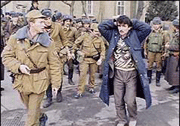 |
| Protesters are causing
disruption to the work |
| 1990: Gorbachev explains crackdown in
Azerbaijan |
England have
President Mikhail Gorbachev has made a statement on Soviet television
explaining the Soviet crackdown on civil unrest in the republic of
Azerbaijan.
Two days ago Soviet troops were ordered into the republic to try and
end the undeclared conflict between Muslim Azeris and Christian Armenians,
and put down a separatist insurrection by Azerbaijani nationalists.
Official reports say up to 60 people died when tanks rolled into the
republic's capital, Baku.
President Gorbachev, who is confronting his worst crisis since he
became leader, said he had no choice but to order his troops in.
"To our deepest regret people have died," the Soviet leader said in a
live 12-minute address on TV.
"Militant nationalist careerists refused to listen to the voice of
reason.
"Events took a particularly tragic turn in Baku. There were growing
calls for seizure of power by force."
He said that he hoped the decision to send in the army would "be
understood and supported by all citizens of our country".
President Gorbachev also extended his deepest condolences to the relatives of the victims
who died in the takeover.
The move comes after tension erupted recently at a nationalist rally in
Soviet Transcaucasia.
In the ensuing pogroms in Baku, Armenian homes were set on fire and
looted while many Armenians were killed or injured.
In the disputed Azerbaijani region of Nagorno-Karabakh, roads were
blocked and trains were halted.
Azerbaijan's President Elmira Kafarova said in a statement broadcast on
Baku radio that her people would "never forgive" those responsible for the
deaths.
Communist Party politician Boris Yeltsin also condemned the use of
armed forces.
"It is a mistake to dispatch troops and suppress ethnic problems by
armed force," he added.
He warned that East European socialism had become corrupted "because it
was state socialism guarded by the military".